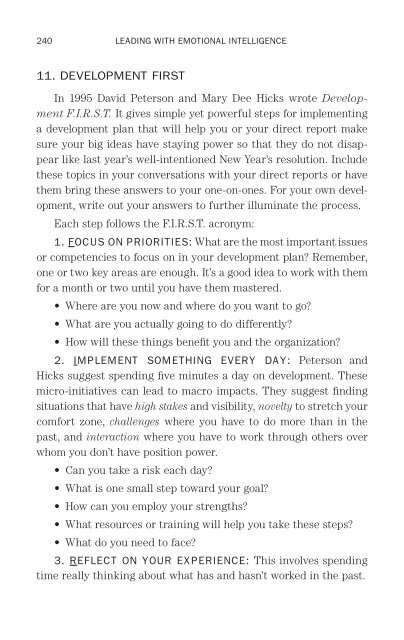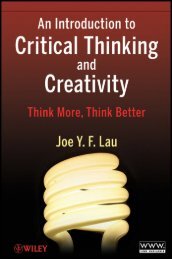- Page 2 and 3:
PRAISE FOR LEADING WITH EMOTIONAL I
- Page 4 and 5:
“Leading with Emotional Intellige
- Page 6 and 7:
“Dr. Reldan Nadler has provided a
- Page 8 and 9:
LEADING WITH EMOTIONAL INTELLIGENCE
- Page 10 and 11:
This book is dedicated to Martin S.
- Page 12 and 13:
CONTENTS PREFACE ACKNOWLEDGMENTS IN
- Page 14 and 15:
CONTENTS xiii CHAPTER THREE: SELF-C
- Page 16 and 17:
CONTENTS xv Experiential Teambuildi
- Page 18 and 19:
CONTENTS xvii 3. White Space Issues
- Page 20 and 21:
PREFACE As a psychologist doing exe
- Page 22 and 23:
ACKNOWLEDGMENTS Iwould like to firs
- Page 24 and 25:
INTRODUCTION WHY EMOTIONAL INTELLIG
- Page 26 and 27:
INTRODUCTION 3 All of us have exper
- Page 28 and 29:
INTRODUCTION 5 LEADERS’ CONSEQUEN
- Page 30 and 31:
INTRODUCTION 7 Great leaders, like
- Page 32 and 33:
INTRODUCTION 9 ativity, and decisio
- Page 34 and 35:
INTRODUCTION 11 the Emotional Quoti
- Page 36 and 37:
INTRODUCTION 13 all point to the pa
- Page 38 and 39:
INTRODUCTION 15 ▲ What can I do a
- Page 40 and 41:
CHAPTER ONE ARE YOU A STAR PERFORME
- Page 42 and 43:
ARE YOU A STAR PERFORMER OR JUST AV
- Page 44 and 45:
ARE YOU A STAR PERFORMER OR JUST AV
- Page 46 and 47:
ARE YOU A STAR PERFORMER OR JUST AV
- Page 48 and 49:
ARE YOU A STAR PERFORMER OR JUST AV
- Page 50 and 51:
ARE YOU A STAR PERFORMER OR JUST AV
- Page 52 and 53:
ARE YOU A STAR PERFORMER OR JUST AV
- Page 54 and 55:
ARE YOU A STAR PERFORMER OR JUST AV
- Page 56 and 57:
ARE YOU A STAR PERFORMER OR JUST AV
- Page 58 and 59:
ARE YOU A STAR PERFORMER OR JUST AV
- Page 60 and 61:
ARE YOU A STAR PERFORMER OR JUST AV
- Page 62 and 63:
ARE YOU A STAR PERFORMER OR JUST AV
- Page 64 and 65:
ARE YOU A STAR PERFORMER OR JUST AV
- Page 66 and 67:
ARE YOU A STAR PERFORMER OR JUST AV
- Page 68 and 69:
ARE YOU A STAR PERFORMER OR JUST AV
- Page 70 and 71:
ARE YOU A STAR PERFORMER OR JUST AV
- Page 72 and 73:
ARE YOU A STAR PERFORMER OR JUST AV
- Page 74 and 75:
ARE YOU A STAR PERFORMER OR JUST AV
- Page 76 and 77:
ARE YOU A STAR PERFORMER OR JUST AV
- Page 78 and 79:
ARE YOU A STAR PERFORMER OR JUST AV
- Page 80 and 81:
ARE YOU A STAR PERFORMER OR JUST AV
- Page 82 and 83:
ARE YOU A STAR PERFORMER OR JUST AV
- Page 84 and 85:
ARE YOU A STAR PERFORMER OR JUST AV
- Page 86 and 87:
ARE YOU A STAR PERFORMER OR JUST AV
- Page 88 and 89:
ARE YOU A STAR PERFORMER OR JUST AV
- Page 90 and 91:
ARE YOU A STAR PERFORMER OR JUST AV
- Page 92 and 93:
ARE YOU A STAR PERFORMER OR JUST AV
- Page 94 and 95:
ARE YOU A STAR PERFORMER OR JUST AV
- Page 96 and 97:
ARE YOU A STAR PERFORMER OR JUST AV
- Page 98 and 99:
ARE YOU A STAR PERFORMER OR JUST AV
- Page 100 and 101:
ARE YOU A STAR PERFORMER OR JUST AV
- Page 102 and 103:
ARE YOU A STAR PERFORMER OR JUST AV
- Page 104 and 105:
ARE YOU A STAR PERFORMER OR JUST AV
- Page 106 and 107:
CHAPTER TWO EMOTIONAL SELF-CONTROL
- Page 108 and 109:
EMOTIONAL SELF-CONTROL TOOLS AND ST
- Page 110 and 111:
EMOTIONAL SELF-CONTROL TOOLS AND ST
- Page 112 and 113:
EMOTIONAL SELF-CONTROL TOOLS AND ST
- Page 114 and 115:
EMOTIONAL SELF-CONTROL TOOLS AND ST
- Page 116 and 117:
EMOTIONAL SELF-CONTROL TOOLS AND ST
- Page 118 and 119:
EMOTIONAL SELF-CONTROL TOOLS AND ST
- Page 120 and 121:
EMOTIONAL SELF-CONTROL TOOLS AND ST
- Page 122 and 123:
EMOTIONAL SELF-CONTROL TOOLS AND ST
- Page 124 and 125:
EMOTIONAL SELF-CONTROL TOOLS AND ST
- Page 126 and 127:
EMOTIONAL SELF-CONTROL TOOLS AND ST
- Page 128 and 129:
EMOTIONAL SELF-CONTROL TOOLS AND ST
- Page 130 and 131:
EMOTIONAL SELF-CONTROL TOOLS AND ST
- Page 132 and 133:
CHAPTER THREE SELF-CONFIDENCE TOOLS
- Page 134 and 135:
SELF-CONFIDENCE TOOLS AND STRATEGIE
- Page 136 and 137:
SELF-CONFIDENCE TOOLS AND STRATEGIE
- Page 138 and 139:
SELF-CONFIDENCE TOOLS AND STRATEGIE
- Page 140 and 141:
SELF-CONFIDENCE TOOLS AND STRATEGIE
- Page 142 and 143:
SELF-CONFIDENCE TOOLS AND STRATEGIE
- Page 144 and 145:
SELF-CONFIDENCE TOOLS AND STRATEGIE
- Page 146 and 147:
SELF-CONFIDENCE TOOLS AND STRATEGIE
- Page 148 and 149:
SELF-CONFIDENCE TOOLS AND STRATEGIE
- Page 150 and 151:
SELF-CONFIDENCE TOOLS AND STRATEGIE
- Page 152 and 153:
SELF-CONFIDENCE TOOLS AND STRATEGIE
- Page 154 and 155:
SELF-CONFIDENCE TOOLS AND STRATEGIE
- Page 156 and 157:
SELF-CONFIDENCE TOOLS AND STRATEGIE
- Page 158 and 159:
SELF-CONFIDENCE TOOLS AND STRATEGIE
- Page 160 and 161:
SELF-CONFIDENCE TOOLS AND STRATEGIE
- Page 162 and 163:
SELF-CONFIDENCE TOOLS AND STRATEGIE
- Page 164 and 165:
CHAPTER FOUR TEAMWORK AND COLLABORA
- Page 166 and 167:
TEAMWORK AND COLLABORATION TOOLS AN
- Page 168 and 169:
TEAMWORK AND COLLABORATION TOOLS AN
- Page 170 and 171:
TEAMWORK AND COLLABORATION TOOLS AN
- Page 172 and 173:
TEAMWORK AND COLLABORATION TOOLS AN
- Page 174 and 175:
TEAMWORK AND COLLABORATION TOOLS AN
- Page 176 and 177:
TEAMWORK AND COLLABORATION TOOLS AN
- Page 178 and 179:
TEAMWORK AND COLLABORATION TOOLS AN
- Page 180 and 181:
TEAMWORK AND COLLABORATION TOOLS AN
- Page 182 and 183:
TEAMWORK AND COLLABORATION TOOLS AN
- Page 184 and 185:
TEAMWORK AND COLLABORATION TOOLS AN
- Page 186 and 187:
TEAMWORK AND COLLABORATION TOOLS AN
- Page 188 and 189:
TEAMWORK AND COLLABORATION TOOLS AN
- Page 190 and 191:
TEAMWORK AND COLLABORATION TOOLS AN
- Page 192 and 193:
TEAMWORK AND COLLABORATION TOOLS AN
- Page 194 and 195:
TEAMWORK AND COLLABORATION TOOLS AN
- Page 196 and 197:
TEAMWORK AND COLLABORATION TOOLS AN
- Page 198 and 199:
TEAMWORK AND COLLABORATION TOOLS AN
- Page 200 and 201:
TEAMWORK AND COLLABORATION TOOLS AN
- Page 202 and 203:
TEAMWORK AND COLLABORATION TOOLS AN
- Page 204 and 205:
TEAMWORK AND COLLABORATION TOOLS AN
- Page 206 and 207:
TEAMWORK AND COLLABORATION TOOLS AN
- Page 208 and 209:
TEAMWORK AND COLLABORATION TOOLS AN
- Page 210 and 211:
TEAMWORK AND COLLABORATION TOOLS AN
- Page 212 and 213: CHAPTER FIVE DEVELOPING OTHERS TOOL
- Page 214 and 215: DEVELOPING OTHERS TOOLS AND STRATEG
- Page 216 and 217: DEVELOPING OTHERS TOOLS AND STRATEG
- Page 218 and 219: DEVELOPING OTHERS TOOLS AND STRATEG
- Page 220 and 221: DEVELOPING OTHERS TOOLS AND STRATEG
- Page 222 and 223: DEVELOPING OTHERS TOOLS AND STRATEG
- Page 224 and 225: DEVELOPING OTHERS TOOLS AND STRATEG
- Page 226 and 227: DEVELOPING OTHERS TOOLS AND STRATEG
- Page 228 and 229: DEVELOPING OTHERS TOOLS AND STRATEG
- Page 230 and 231: DEVELOPING OTHERS TOOLS AND STRATEG
- Page 232 and 233: DEVELOPING OTHERS TOOLS AND STRATEG
- Page 234 and 235: DEVELOPING OTHERS TOOLS AND STRATEG
- Page 236 and 237: DEVELOPING OTHERS TOOLS AND STRATEG
- Page 238 and 239: DEVELOPING OTHERS TOOLS AND STRATEG
- Page 240 and 241: DEVELOPING OTHERS TOOLS AND STRATEG
- Page 242 and 243: DEVELOPING OTHERS TOOLS AND STRATEG
- Page 244 and 245: DEVELOPING OTHERS TOOLS AND STRATEG
- Page 246 and 247: DEVELOPING OTHERS TOOLS AND STRATEG
- Page 248 and 249: DEVELOPING OTHERS TOOLS AND STRATEG
- Page 250 and 251: DEVELOPING OTHERS TOOLS AND STRATEG
- Page 252 and 253: DEVELOPING OTHERS TOOLS AND STRATEG
- Page 254 and 255: DEVELOPING OTHERS TOOLS AND STRATEG
- Page 256 and 257: DEVELOPING OTHERS TOOLS AND STRATEG
- Page 258 and 259: DEVELOPING OTHERS TOOLS AND STRATEG
- Page 260 and 261: DEVELOPING OTHERS TOOLS AND STRATEG
- Page 264 and 265: DEVELOPING OTHERS TOOLS AND STRATEG
- Page 266 and 267: DEVELOPING OTHERS TOOLS AND STRATEG
- Page 268 and 269: CHAPTER SIX COMMUNICATION AND EMPAT
- Page 270 and 271: COMMUNICATION AND EMPATHY TOOLS AND
- Page 272 and 273: COMMUNICATION AND EMPATHY TOOLS AND
- Page 274 and 275: COMMUNICATION AND EMPATHY TOOLS AND
- Page 276 and 277: COMMUNICATION AND EMPATHY TOOLS AND
- Page 278 and 279: COMMUNICATION AND EMPATHY TOOLS AND
- Page 280 and 281: COMMUNICATION AND EMPATHY TOOLS AND
- Page 282 and 283: COMMUNICATION AND EMPATHY TOOLS AND
- Page 284 and 285: COMMUNICATION AND EMPATHY TOOLS AND
- Page 286 and 287: COMMUNICATION AND EMPATHY TOOLS AND
- Page 288 and 289: COMMUNICATION AND EMPATHY TOOLS AND
- Page 290 and 291: COMMUNICATION AND EMPATHY TOOLS AND
- Page 292 and 293: COMMUNICATION AND EMPATHY TOOLS AND
- Page 294 and 295: COMMUNICATION AND EMPATHY TOOLS AND
- Page 296 and 297: COMMUNICATION AND EMPATHY TOOLS AND
- Page 298 and 299: COMMUNICATION AND EMPATHY TOOLS AND
- Page 300 and 301: COMMUNICATION AND EMPATHY TOOLS AND
- Page 302 and 303: COMMUNICATION AND EMPATHY TOOLS AND
- Page 304 and 305: COMMUNICATION AND EMPATHY TOOLS AND
- Page 306 and 307: COMMUNICATION AND EMPATHY TOOLS AND
- Page 308 and 309: COMMUNICATION AND EMPATHY TOOLS AND
- Page 310 and 311: COMMUNICATION AND EMPATHY TOOLS AND
- Page 312 and 313:
COMMUNICATION AND EMPATHY TOOLS AND
- Page 314 and 315:
COMMUNICATION AND EMPATHY TOOLS AND
- Page 316 and 317:
COMMUNICATION AND EMPATHY TOOLS AND
- Page 318 and 319:
COMMUNICATION AND EMPATHY TOOLS AND
- Page 320 and 321:
COMMUNICATION AND EMPATHY TOOLS AND
- Page 322 and 323:
COMMUNICATION AND EMPATHY TOOLS AND
- Page 324 and 325:
COMMUNICATION AND EMPATHY TOOLS AND
- Page 326 and 327:
CHAPTER SEVEN THE GAME PLAN Great l
- Page 328 and 329:
THE GAME PLAN 305 • Key executive
- Page 330 and 331:
THE GAME PLAN 307 4. Success Rules:
- Page 332 and 333:
THE GAME PLAN 309 10. Focus on Stre
- Page 334 and 335:
THE GAME PLAN 311 5. What will keep
- Page 336 and 337:
THE GAME PLAN 313 MONTH: YEAR: WEEK
- Page 338 and 339:
NOTES INTRODUCTION 1. W. Bennis,
- Page 340 and 341:
NOTES 317 24. M. Buffett and D. Cla
- Page 342 and 343:
NOTES 319 86. M. Buckingham, The On
- Page 344 and 345:
NOTES 321 CHAPTER FOUR 1. H. A. Elf
- Page 346 and 347:
BIBLIOGRAPHY Alexander, J. “From
- Page 348 and 349:
BIBLIOGRAPHY 325 Everts, D. “Carl
- Page 350 and 351:
BIBLIOGRAPHY 327 Maslow, A. Toward
- Page 352 and 353:
ADDITIONAL RESOURCES The following
- Page 354 and 355:
ADDITIONAL RESOURCES 331 EQ Univers
- Page 356 and 357:
INDEX Accountability and consequenc
- Page 358 and 359:
INDEX 335 Derailers of Bill Clinton
- Page 360 and 361:
INDEX 337 Le Doux, Joseph, 86 Leade
- Page 362 and 363:
INDEX 339 eight strategies for, 92-
- Page 364 and 365:
ABOUT THE AUTHOR Dr. Reldan S. Nadl
- Page 366 and 367:
HOW TO ENGAGE THE AUTHOR TO BRING E
- Page 368:
Go to our website for more informat
















